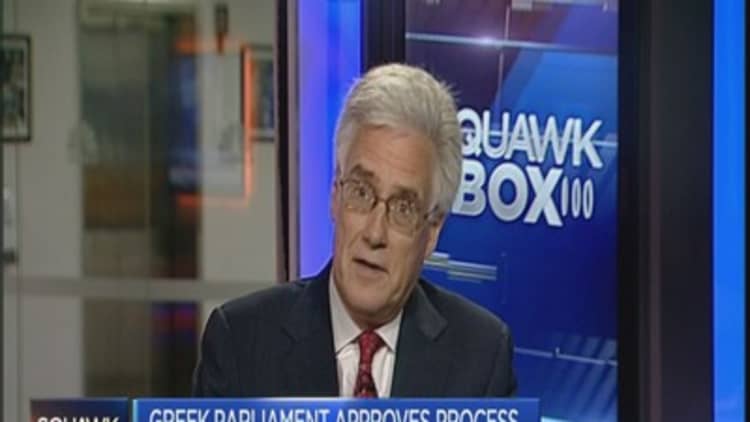
As if Greece didn't have enough economic market woes, last week foreign investment funds managed to take control of four of the country's largest banks — Alpha Bank, Eurobank, National Bank of Greece and Piraeus Bank — through $6.42 billion worth of capital increases and a complex set of legal manipulations. As a result, bank shares sold like penny stocks, diluting state ownership in these important institutions that have assets totaling $358 billion.
The country's stake in the National Bank of Greece dropped to 24 percent from 57 percent, and in Eurobank it fell to 2.4 percent from 35 percent, while its stake in Alpha Bank was reduced to 11 percent from 64 percent and in Piraeus Bank it dropped to 22 percent from 67 percent. This translates to a loss of almost $44 billion that Greek taxpayers gave to bail out the banks over the past three years.
Greek stock market and legal experts believe that the maneuvers were engineered after a statutory legal provision was amended by the Greek Parliament that allowed private investors to price bank shares using a so-called "book-building method." Under this method, the share price in capital increases is not predetermined, and investors set the price at which they want to buy the shares.
It also made it mandatory for the country's regulatory body, the Hellenic Financial Stability Fund, to accept book-building prices, even if they were not properly reflecting share values.
Read MoreGreece reaches initial deal with lenders over foreclosures
According to Greek banking sources, Capital Group, Pimco, WLR Recovery Fund, Wellington, Fairfax, Brookfield Capital Partners and Highfields Capital Management are among those who jumped at the opportunity to invest in Greek banks at below-market value this month. The foreign investors valued the four banks at about $800 million, which is more than three times less than their current market value of $3 billion. Moreover, from Nov. 4 to Nov. 20, when the book building took place, the index of bank shares on the Greek stock market fell nearly 70 percent.
This has hit the banks hard, according to Nikos Chryssochoidis, an Athens-based stockbroker. "In just 13 trading sessions, Alpha Bank's stock dropped to .055 euros from its 0.125 euros closing on Nov. 4, losing 56 percent."
"These are horrendous figures," Emilios Avgouleas, a professor of banking law at the University of Edinburgh, told CNBC. "What is so disturbing is that this fire sale is going on with the blessings of European creditors. That makes it hard to brand it an asset looting. The loss for Greek taxpayers is enormous."
Read More

As the dust settles, the blame game is in full swing. The HFSF argues that its decisions are lawful and in line with the legislation passed by the Greek Parliament. The country's creditors and euro zone officials have waived their responsibilities.
In the meantime, there are worries about how this could affect overall trading on the Hellenic Stock Exchange.
On Monday, Euro-area member states agreed to disperse 10 billion euros for the recapitalization of Greek banks after the nation completed the first set of milestones that included the overhaul of bank governance rules, eased restrictions on home foreclosures and raised wine and road taxes. These funds will be released to the Hellenic Financial Stability Fund on a case-by-case basis, as required by the European Commission.
At the same time, Greek creditors want the country's authorities to tackle the remaining vulnerabilities in the banking system, notably those arising from $114 billion worth of nonperforming loans.
If there is a capital shortfall in Greek banks that private investors cannot cover in 2016, then the EU will impose a surcap on unsecured bank deposits that are more than 100,000 euros ($107,000), like they did in Cyprus during its financial crisis three years ago. At that time, a 10-billion-euro bailout by the Eurogroup, European Commission and the IMF resulted in the closure of the country's second-largest bank and a onetime bank deposit levy on all uninsured bank depositors.
To date, the European Union has lent $49.22 billion to bail out Greek banks.
— By Nasos Koukakis, special to CNBC.com




